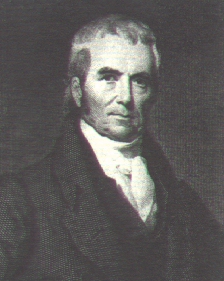History 2700 MacKay
Unit 7
The New Republic
John Marshall's Precedents/Legal Status of Women
 John
Marshal: Officer in the Revolution; Virginia Legislature; Virginia Ratification
Convention; XYZ Mission to France, 1797; Congressman, 1799-1800; Secretary of
State, 1800-1801; sworn in as Chief Justice of the United States, February 4,
1801; died in office, July 6, 1835.
John
Marshal: Officer in the Revolution; Virginia Legislature; Virginia Ratification
Convention; XYZ Mission to France, 1797; Congressman, 1799-1800; Secretary of
State, 1800-1801; sworn in as Chief Justice of the United States, February 4,
1801; died in office, July 6, 1835.
Readings:
The power of judicial review
Marbury
v. Madison 1803
|
Is Marbury entitled to his commission?
|
Does Section 13 of the Judiciary Act
authorize the Court to issue a writ of mandamus?
|
Is Section 13 of the Judiciary Act
constitutional?
|
If Section 13 of the Judiciary Act is
unconstitutional, does the Supreme Court have the power to declare it
void?
|
Also described in
Landmark Supreme Court Cases
McClulloch
v. Maryland 1819
Gibbons v.
Ogden 1824
Cherokee
v. Georgia 1831 and
Worcester
v. Georgia 1832
Worcester is considered
one of the most influential decisions in the area of law applicable to
American Indians. The Marshall court had previously ruled in
Cherokee Nation v. Georgia that Indian tribes in the United
States did not have the status of foreign nations (famously describing
them as "domestic dependent nations"); here the court ruled that the
Cherokee nation was a "distinct community" with self-government, "in
which the laws of Georgia can have no force". This ruling established
the doctrine that the national government of the United States—and not
individual states—had authority in Indian affairs.
In reaction to this decision,
President Andrew Jackson has often been quoted as defying the Supreme Court
with the words: "John Marshall has made his decision; now let him
enforce it!" Jackson never actually said this; in fact, because of a
legal loophole, he had no grounds for becoming involved unless the
Georgia courts formally defied the Supreme Court. That did not happen,
since the state of Georgia simply ignored the ruling. What Jackson
actually said was that "the decision of the supreme court has fell still
born, and they find that they cannot coerce Georgia to yield to its
mandate." Jackson's opponents criticized him for failing to act against
Georgia, but even if he had wanted to intervene—and he did not—he had no
legal authority to do so.
Zinn: Chpt. 6
Brown and Shannon: Chpt. 6
Declaration of Sentiments (1848)
Recommended Readings: Don't Know Much:
135-39, 141-44
Discussion topics:
- How might the court’s interpretation of key
clauses of the Constitution set a precedent for future cases? What impact did
the Marshall Court have on the U.S. government?
- What is femme coveture? How is that
concept challenged by theories about inalienable rights, democracy,
republicanism?
Project #5: Read at least three of the articles in Time's special issue "The
Radical Mind of Thomas Jefferson," July 5 2004. Comment on how the writers are trying to make Jefferson's life and ideas
relevant in our own times--in other words, why should we care about Jefferson?
Comment on how the writers help us have a historical perspective as we consider
the issues of the New Republic.
 John
Marshal: Officer in the Revolution; Virginia Legislature; Virginia Ratification
Convention; XYZ Mission to France, 1797; Congressman, 1799-1800; Secretary of
State, 1800-1801; sworn in as Chief Justice of the United States, February 4,
1801; died in office, July 6, 1835.
John
Marshal: Officer in the Revolution; Virginia Legislature; Virginia Ratification
Convention; XYZ Mission to France, 1797; Congressman, 1799-1800; Secretary of
State, 1800-1801; sworn in as Chief Justice of the United States, February 4,
1801; died in office, July 6, 1835.